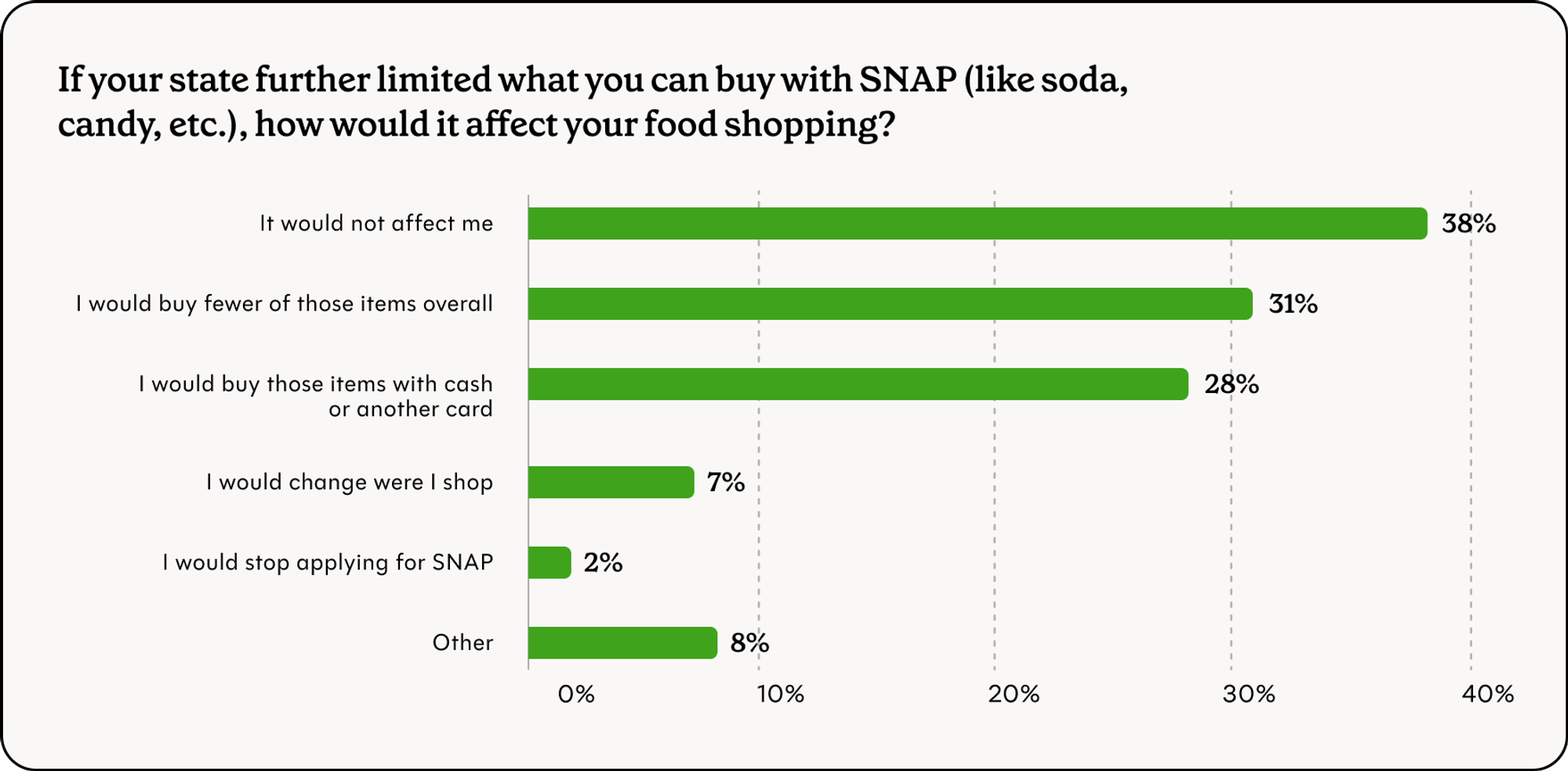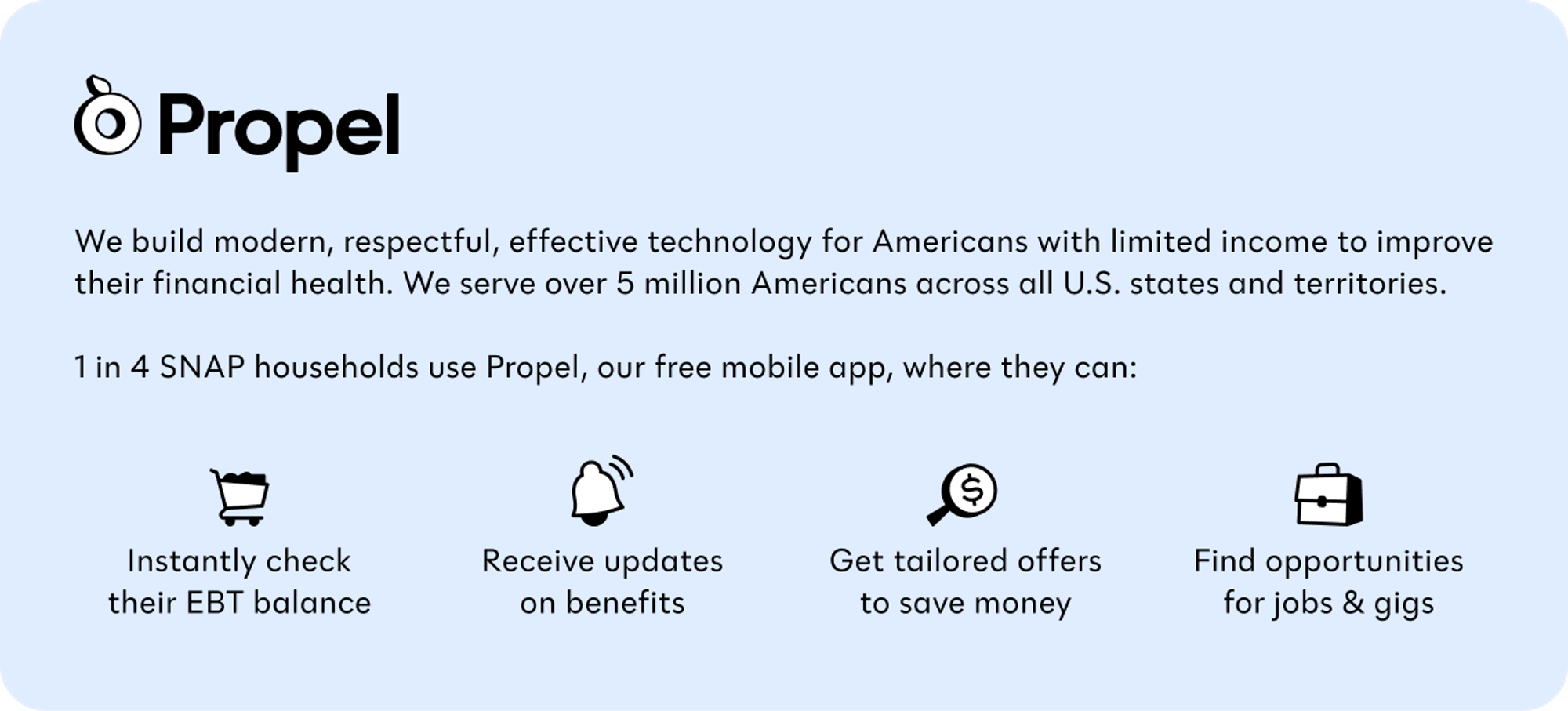
Table of contents
Summary#summary
Propel surveyed 2,216 users in nine states (AZ, CO, CT, GA, IN, MD, NC, PA, WI) between July 1 - 14, 2025. The survey asked recipients for their perspectives on two major SNAP changes enacted in 2025: expanded work requirements and new restrictions on SNAP-eligible items in select states. The findings below provide an early look at how changes to SNAP are being received by customers who will navigate their real impacts.
Most respondents say they are currently exempt from work requirements, but confusion remains widespread#most-respondents-say-they-are-currently-exempt-from-work-requirements-but-confusion-remains-widespread
- Across all nine states in the survey, 37% of respondents say they currently report their work to get their benefits, while 43% say they are exempt and 20% say they don’t know their status.
- Colorado (52%) and Wisconsin (49%) had higher percentages of work-exempt respondents, while Arizona (43%), Connecticut (45%), and Pennsylvania (42%) were only slightly higher than average. These five states have partial waivers in place for able-bodied adults without dependents (ABAWDs) that expire later this year. However, the percentage of respondents who claimed to be exempt and states with active ABAWD waivers are not strongly correlated in this survey, as these states have partial (not statewide) waivers and respondents may not live in areas where the waivers apply. Also, respondents could be exempt for other reasons, such as age or disability.
- Maryland, where a partial ABAWD waiver expired on June 30, had the highest percentage of respondents (28%) who did not know their status regarding work requirements. This may indicate some confusion among formerly exempt individuals who may have heard about the expiring waiver but haven’t yet taken action to keep their benefits.
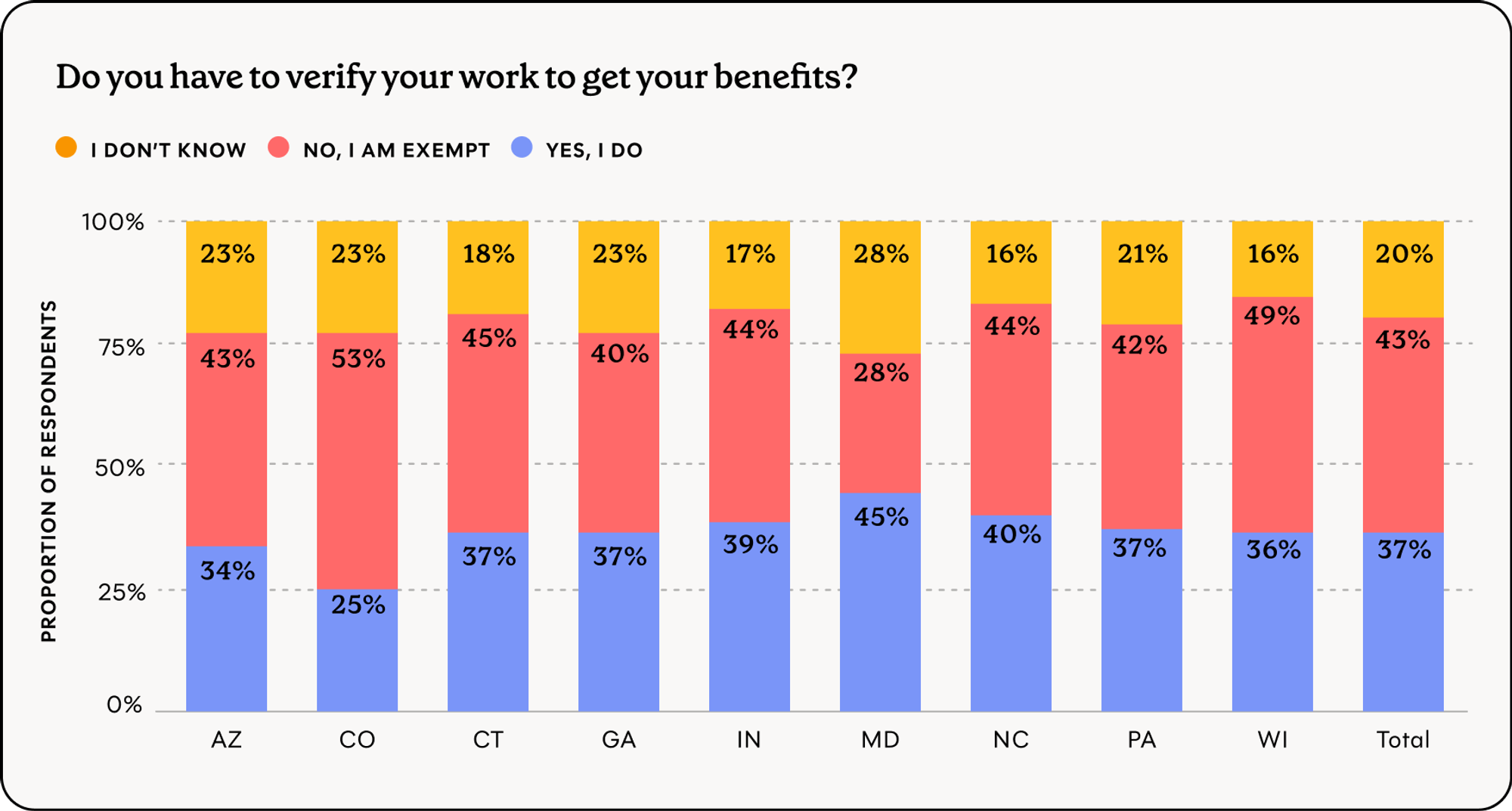

Respondents showed a strong preference for work reporting via online portals#respondents-showed-a-strong-preference-for-work-reporting-via-online-portals
- State websites and portals are generally the preferred method across all nine states in the survey. Over 50% of respondents in Connecticut and Georgia say they report their work online through the state’s website or portal, compared to just 21% in Arizona and 16% in North Carolina. The reasons for this discrepancy are unclear but may be partially explained by portal complexity between states. For example, Connecticut’s MyDSS portal asks users to simply log in with their DSS account while North Carolina’s ePASS requires users to both “enhance” and “link” an NCID account before they can report changes online – a two‐step process that can deter many users. Furthermore, Georgia’s Gateway portal serves as a single stop for several benefits programs while Arizona splits benefits reporting across two systems – Health-e-Arizona Plus for medical assistance and MyFamilyBenefits for cash and nutrition assistance.
- The utilization of other methods such as in-person, over the phone, and email reporting vary widely by state. Over-the-phone reporting is the most popular method in Arizona (29%) and the second most popular method in Wisconsin (23%), while respondents in North Carolina favor in-person reporting (30%) over all other methods.
- 12% of all respondents who are required to report their work say they don’t know how to do so. This percentage of respondents is highest in Arizona (16%), Indiana (15%), and Pennsylvania (14%).
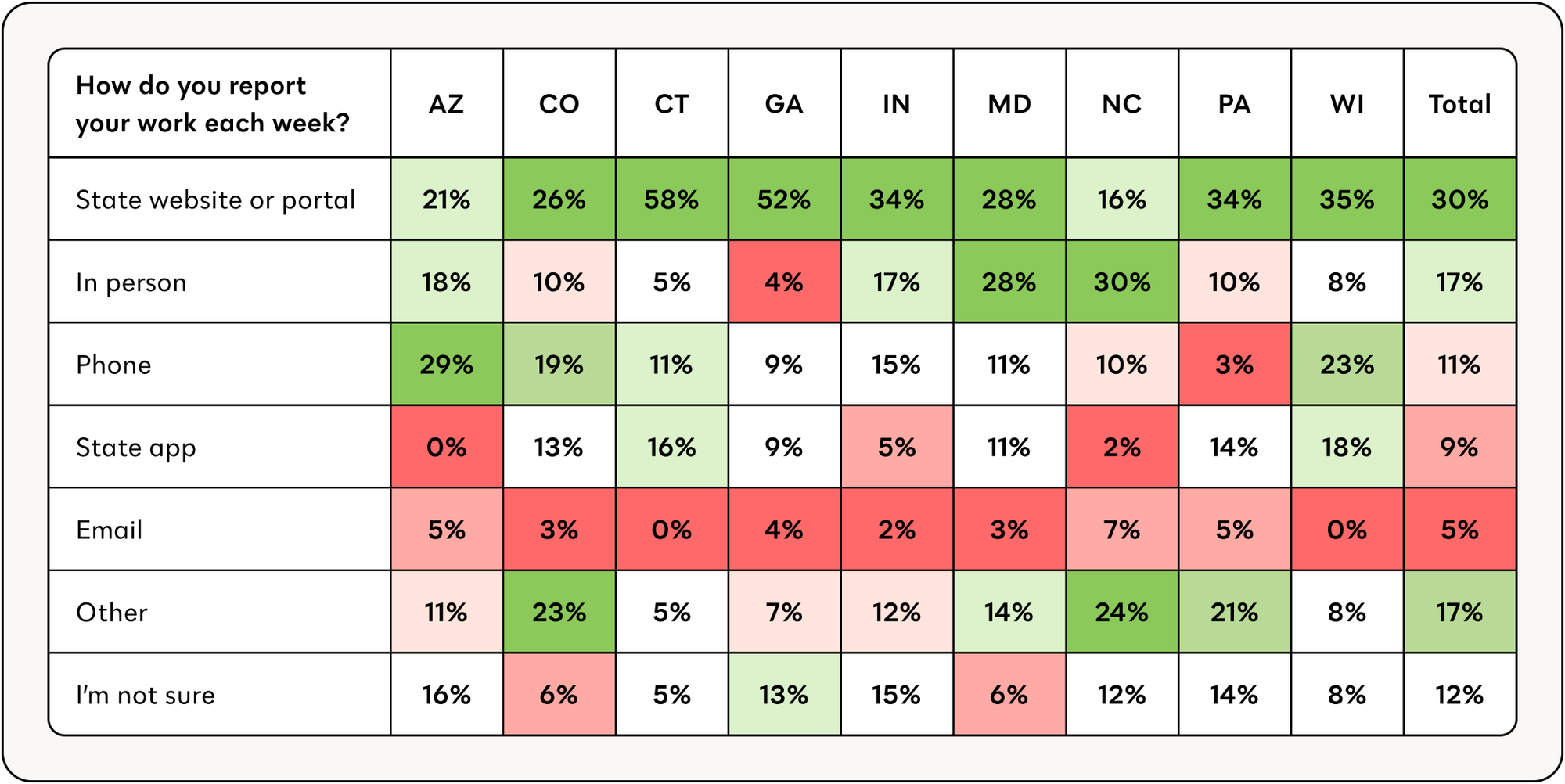
Uploading documentation is a top reporting challenge, part-time work complicates compliance#uploading-documentation-is-a-top-reporting-challenge-part-time-work-complicates-compliance
- 39% of all respondents say uploading documentation is the most difficult part of reporting hours, a consistent theme across each state in the survey. This finding supports what Propel has heard repeatedly from users over the years. Specifically, users report challenges with lost or unacknowledged document submissions, inconsistent and confusing formatting requirements from caseworkers, delays in review, shifting documentation demands at each renewal, and difficulty obtaining paperwork from third parties such as employers or landlords.
- Over 20% of respondents in Colorado and Maryland struggle with understanding how to report their hours while 21% of respondents in Connecticut say they would like more individualized help with the process.
- Those who indicated “other” challenges most often cited inconsistent income or work schedules that make reporting difficult (e.g., gig work). Some respondents also cited difficulty due to errors by caseworkers, such as lost paperwork or lack of communication.
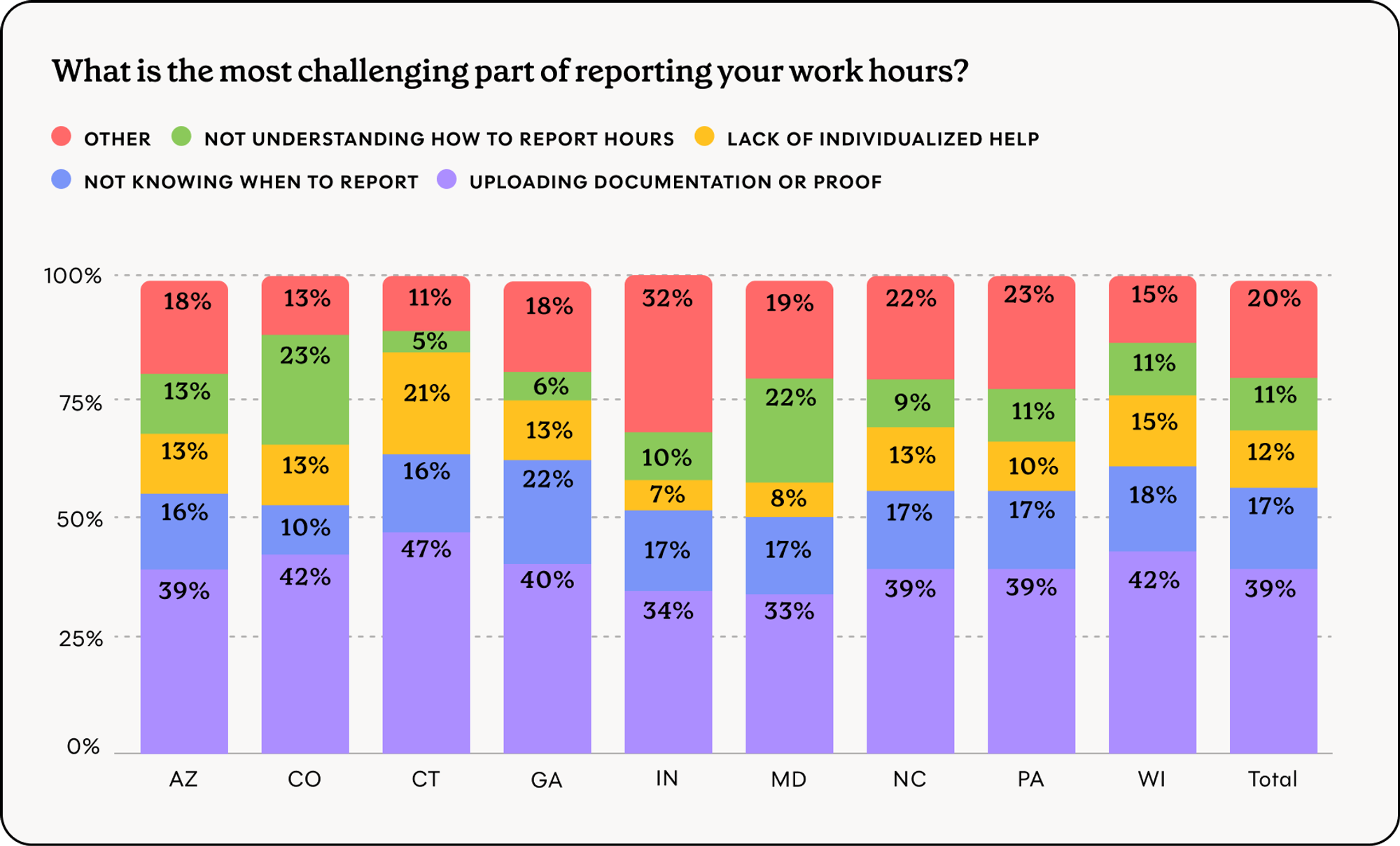

Respondents were broadly aware of new work requirements but divided on their impacts#respondents-were-broadly-aware-of-new-work-requirements-but-divided-on-their-impacts
- 71% of respondents across nine states are aware of the new work requirements recently enacted by Congress for ABAWDs and some parents.
- 31% of respondents across nine states say they would try to meet the new work requirements. Another 31% say they would not be affected and 25% say they are not sure what they would do.
- Connecticut, Georgia, and Indiana have the highest percentage of respondents who are prepared to meet the new requirements, while most respondents in Colorado and Pennsylvania think new SNAP work requirements are unlikely to affect them.
- Uncertainty appears to be particularly high in North Carolina and Wisconsin, where 28% of respondents say they are not sure how new work requirements would affect them. High levels of uncertainty could signal the risk of unintentional benefit loss due to recipient confusion, not just noncompliance.
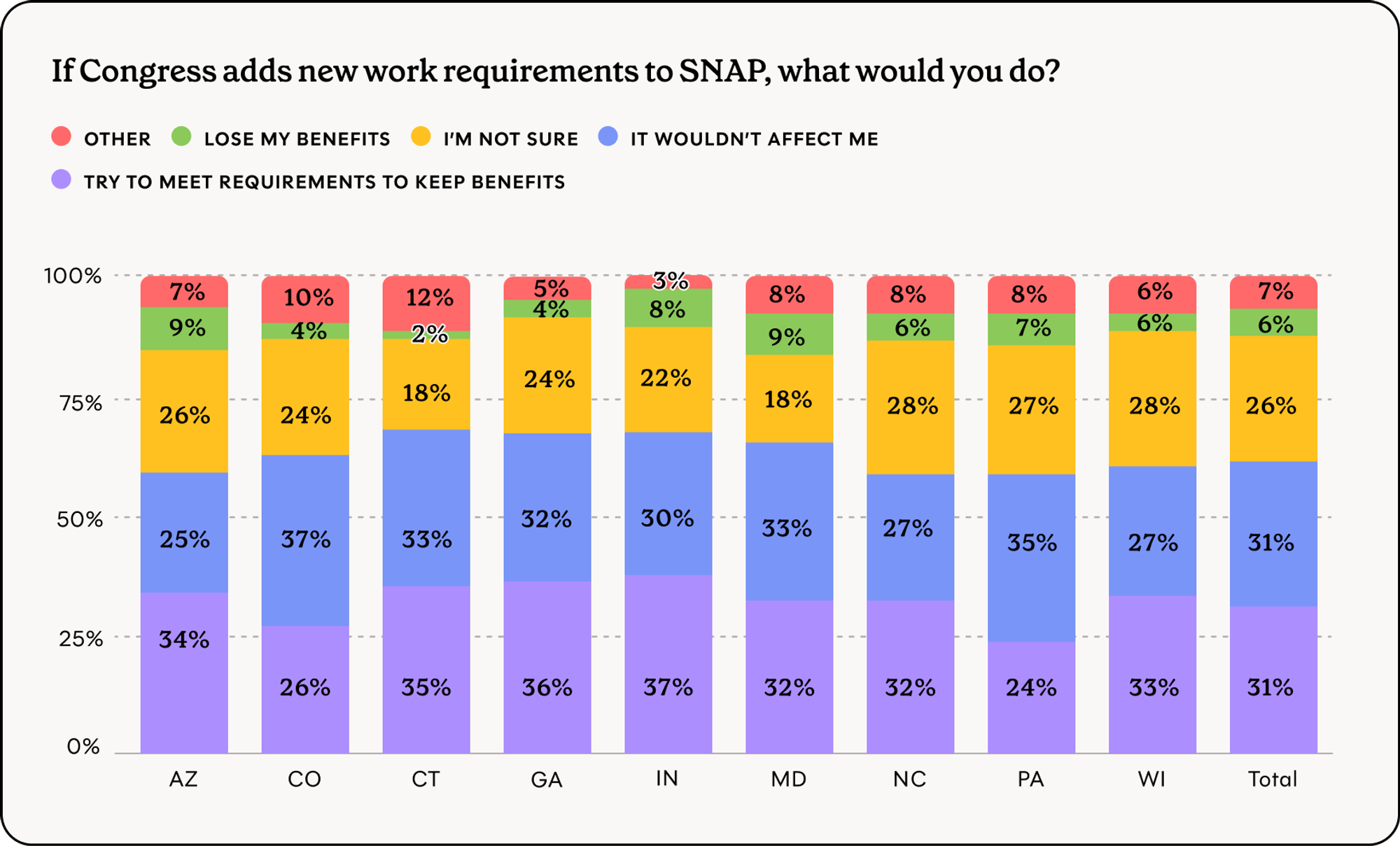
Most respondents are aware of new SNAP item restrictions. Many wouldn’t be impacted, while some would adjust their purchasing behavior#most-respondents-are-aware-of-new-snap-item-restrictions-many-wouldnt-be-impacted-while-some-would-adjust-their-purchasing-behavior
- 68% of respondents across nine states are aware of efforts by some states to limit SNAP purchases of soda, candy, and other items. 85% of respondents in Indiana say they are aware, likely because the state plans to implement these restrictions in early 2026. Customers in states without set plans still have high levels of awareness, including Colorado (55%) and Maryland (57%).
- In terms of existing SNAP item restrictions, 35% say they can’t buy things they need with SNAP dollars such as hot food, vitamins, and pet food. Colorado (42%), Connecticut (39%), and Indiana (39%) report struggling with existing item restrictions more than the other states.
- Overall, 38% say they wouldn’t be affected by new SNAP item restrictions in their state. 31% say they would just buy fewer of those items and 28% would use cash or a non-EBT card to pay for them.
- Only a small percentage say that new SNAP item restrictions would cause them to alter their behavior, either by changing where they shop (7%) or not participating in SNAP (2%).
- Many unaffected respondents said that they don’t consume items like soda or candy. Other respondents said that such restrictions would mean less opportunities to give their kids the occasional splurge item as a nice treat.
